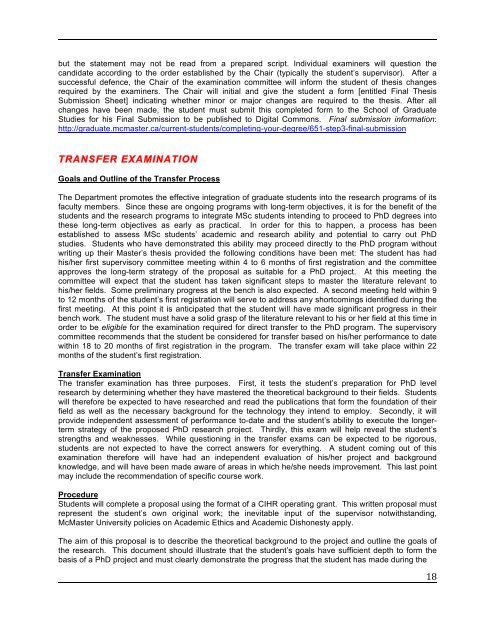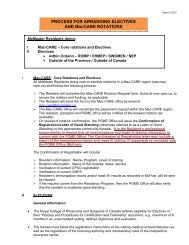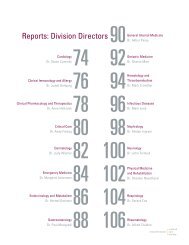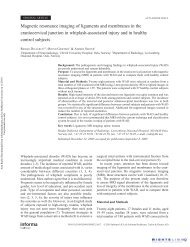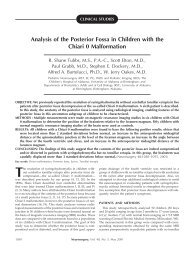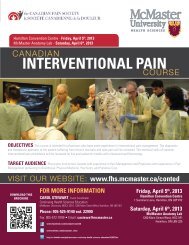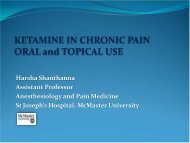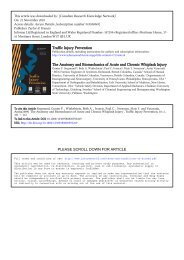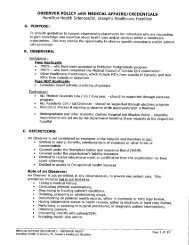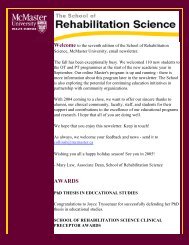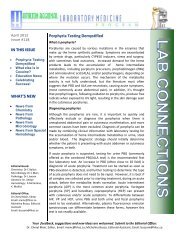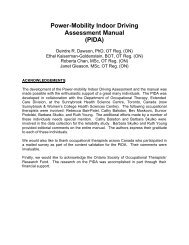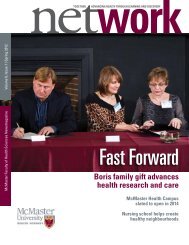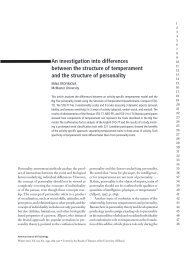Graduate Handbook - Faculty of Health Sciences - McMaster ...
Graduate Handbook - Faculty of Health Sciences - McMaster ...
Graduate Handbook - Faculty of Health Sciences - McMaster ...
Create successful ePaper yourself
Turn your PDF publications into a flip-book with our unique Google optimized e-Paper software.
ut the statement may not be read from a prepared script. Individual examiners will question the<br />
candidate according to the order established by the Chair (typically the student’s supervisor). After a<br />
successful defence, the Chair <strong>of</strong> the examination committee will inform the student <strong>of</strong> thesis changes<br />
required by the examiners. The Chair will initial and give the student a form [entitled Final Thesis<br />
Submission Sheet] indicating whether minor or major changes are required to the thesis. After all<br />
changes have been made, the student must submit this completed form to the School <strong>of</strong> <strong>Graduate</strong><br />
Studies for his Final Submission to be published to Digital Commons. Final submission information:<br />
http://graduate.mcmaster.ca/current-students/completing-your-degree/651-step3-final-submission<br />
TRANSFER EXAMINATION<br />
Goals and Outline <strong>of</strong> the Transfer Process<br />
The Department promotes the effective integration <strong>of</strong> graduate students into the research programs <strong>of</strong> its<br />
faculty members. Since these are ongoing programs with long-term objectives, it is for the benefit <strong>of</strong> the<br />
students and the research programs to integrate MSc students intending to proceed to PhD degrees into<br />
these long-term objectives as early as practical. In order for this to happen, a process has been<br />
established to assess MSc students’ academic and research ability and potential to carry out PhD<br />
studies. Students who have demonstrated this ability may proceed directly to the PhD program without<br />
writing up their Master’s thesis provided the following conditions have been met: The student has had<br />
his/her first supervisory committee meeting within 4 to 6 months <strong>of</strong> first registration and the committee<br />
approves the long-term strategy <strong>of</strong> the proposal as suitable for a PhD project. At this meeting the<br />
committee will expect that the student has taken significant steps to master the literature relevant to<br />
his/her fields. Some preliminary progress at the bench is also expected. A second meeting held within 9<br />
to 12 months <strong>of</strong> the student’s first registration will serve to address any shortcomings identified during the<br />
first meeting. At this point it is anticipated that the student will have made significant progress in their<br />
bench work. The student must have a solid grasp <strong>of</strong> the literature relevant to his or her field at this time in<br />
order to be eligible for the examination required for direct transfer to the PhD program. The supervisory<br />
committee recommends that the student be considered for transfer based on his/her performance to date<br />
within 18 to 20 months <strong>of</strong> first registration in the program. The transfer exam will take place within 22<br />
months <strong>of</strong> the student’s first registration.<br />
Transfer Examination<br />
The transfer examination has three purposes. First, it tests the student’s preparation for PhD level<br />
research by determining whether they have mastered the theoretical background to their fields. Students<br />
will therefore be expected to have researched and read the publications that form the foundation <strong>of</strong> their<br />
field as well as the necessary background for the technology they intend to employ. Secondly, it will<br />
provide independent assessment <strong>of</strong> performance to-date and the student’s ability to execute the longerterm<br />
strategy <strong>of</strong> the proposed PhD research project. Thirdly, this exam will help reveal the student’s<br />
strengths and weaknesses. While questioning in the transfer exams can be expected to be rigorous,<br />
students are not expected to have the correct answers for everything. A student coming out <strong>of</strong> this<br />
examination therefore will have had an independent evaluation <strong>of</strong> his/her project and background<br />
knowledge, and will have been made aware <strong>of</strong> areas in which he/she needs improvement. This last point<br />
may include the recommendation <strong>of</strong> specific course work.<br />
Procedure<br />
Students will complete a proposal using the format <strong>of</strong> a CIHR operating grant. This written proposal must<br />
represent the student’s own original work; the inevitable input <strong>of</strong> the supervisor notwithstanding,<br />
<strong>McMaster</strong> University policies on Academic Ethics and Academic Dishonesty apply.<br />
The aim <strong>of</strong> this proposal is to describe the theoretical background to the project and outline the goals <strong>of</strong><br />
the research. This document should illustrate that the student’s goals have sufficient depth to form the<br />
basis <strong>of</strong> a PhD project and must clearly demonstrate the progress that the student has made during the<br />
<br />
18


